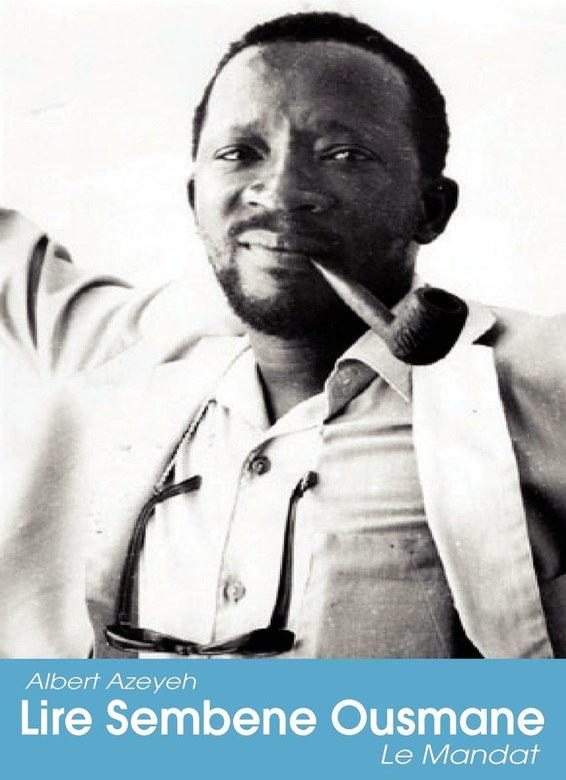written by Albert Azeyeh
Le Mandat
Ousmane Sembène commence d’écrire dès 1952. Docker Noir, son premier roman inspiré de l’expérience de Marseille, paraît en 1956 aux éditions Debresse. En 1957 les éditions Amiot Dumont publient O Pays, mon beau Peuple, procès en règle de la situation coloniale. Cette double production inaugurale, nettement autobiographique et sentimentale est suivie d’une contribution monumentale à la connaissance de la grève des cheminots du Dakar-Niger, doublée d’un chef-oeuvre du roman africain : Les Bouts de Bois de Dieu qui paraît en 1960 au Livre contemporain. Les Editions Présence Africaine publient en 1961 son recueil de nouvelles, Voltaïque, en 1964 le premier tome de L’Harmattan qui est la reconstitution du référendum du 28 septembre 1958 en Afrique noire, et, en 1966 Vehi-Ciosane suivi du Mandat. Auteur à cette date de six œuvres romanesques, et cinéaste de renom, Ousmane Sembène décide, à l’aide de sa plume acérée et de son regard alerte et mobile, d’examiner le sort que la nouvelle bourgeoisie et la bureaucratie administrative font au menu peuple de cette belle immonde, Dakar, la capitale d’un pays de l’Afrique des indépendances. Par le biais d’un mandat que celui-ci veut percevoir, l’écrivain cinéaste promène le personnage d’Ibrahima Dieng à travers le dédale administratif-urbain et les chicanes du voisinage et de la famille du quartier, relevant et pointant au passage les travers, les abus, les vices et les vicissitudes qui tissent cette tranche de vie à tous points exemplaire. Le récit s’ouvre sur l’arrivée du facteur portant une lettre et un mandat à problèmes ; il se clôt sur l’image du facteur remettant une lettre à Dieng, quand survient une femme avec un bébé sur le dos, qui les interrompt pour égrener le chapelet de ses malheurs, demandant qu’on lui vienne en aide.
Ousmane Sembène started writing by 1952. The Black Docker, his first novel inspired by the Marseille experience was published in 1956 by Debresse. In 1957, Amiot Dumont published O Pays, mon beau Peuple, a caustic critic of the colonial plight. This second inaugural piece, clearly autobiographical and sentimental is followed up by a vast knowledge of the strike of the Dakar-Niger railway workers: God’s Bits of Woodpublished in 1960 by Livre Contemporain. In 1961, Présence Africaine pulished his collection of short stories, Voltaïque, in 1964 the first volume of l’Harmattan which is a replay of the 28th September 1958 referendum in black Africa and in 1966 Vehi-Ciosanefollowed by The Money Order. To this date with six published novels and a renown Cinematographer, Ousmane Sembène with the help of his sharp pen and his critical and observant look decides to examine the fate that the new bourgeoisie and the administrative bureaucracy mete on the downtrodden of this ignominious beauty, Dakar, the Capital of an African nation in the wake of independence. Thanks to a money order that Ibrahima Dieng wants to cash, the film maker/writer takes this character through the urban administrative labyrinth, through neighbourly disputes and through family life in the neighbourhood, highlighting and pointing in passing the crossings, abuses, vices and vicissitudes which make up this segment of life, in every aspect, exemplary. The story unfolds with the arrival of a postman carrying a letter and a problematic money order; it ends on the image of the postman handing a letter to Dieng, when a woman carrying a baby on her back comes in and interrupts them to expose the origins of her misfortunes, asking for help.
| ISBN | 9789956717064 |
| Pages | 98 |
| Dimensions | 203 x 127 mm |
| Published | 2011 |
| Publisher | Langaa RPCIG, Cameroon |
| Format | Paperback |




